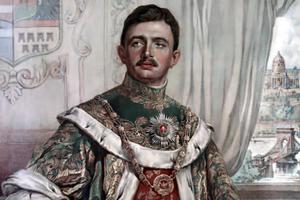Blessed Karl of Austria May Be Canonized Someday — Here’s How You Can Help
The 2024 Blessed Karl Symposium will take place April 13 at the Robinson Fine Arts Center in Plano, Texas.

“From his life, we can learn that it is not necessarily the results or the achievements that count but the will to try to do what is right. And if the rewards don’t come immediately, there is no need to despair; if we live rightly, we can trust in God’s promise that they will come later in the form of heavenly blessings” —Archduke Karl von Habsburg, in Charles Coulombe’s Blessed Charles of Austria: A Holy Emperor and His Legacy
I have written several times about the life of Blessed Karl of Austria. One might ask, “Why does a Byzantine deacon have an interest in an Austrian emperor?” Everyone with a connection to the life and example of Blessed Karl seems to have a story, so I will briefly tell mine.
Shortly after graduating from college, I went on a retreat with a group of Cistercian monks in Wisconsin. These monks had as their motherhouse the Territorial Abbey of Wettingen-Mehrerau in Austria. They learned from their Austrian confreres about the life and heroic virtues of Blessed Karl. The community had a regular devotion to Blessed Karl and entrusted their intentions to his intercession.
From that retreat experience, I began to learn more about Blessed Karl. I was first attracted to the connection between his name and the name Karol Wojtyła. Like many of my generation, I was drawn to the charisma and virtues of Pope St. John Paul II. To learn that his father had named the future pontiff after the last Austro-Hungarian Emperor-King was fascinating to me.
From there I began to learn more about his cause for canonization. At the time, his cause in the United States was centered at St. Vincent’s Archabbey in Latrobe, Pennsylvania. I got in touch with Benedictine Brother Nathan Cochran at St. Vincent’s and he sent me several booklets on Blessed Karl. Learning about Karl’s life from those booklets and beginning to pray for his intercession made me comfortable with my new heavenly friend.
What struck me at the time was his devotion to his wife, Empress Zita (now Servant of God). On their wedding day, he told his fiancée “Now, we must help each other to get to Heaven.” Having been poorly catechized regarding the sacrament of marriage, I understood the real mission of married life thanks to this “small catechism” from Blessed Karl. After our wedding, I presented my wife with a picture of Blessed Karl and Empress Zita and they have been our heavenly intercessors ever since. Blessed Karl continues to inspire us. Our fifth son is Albert Karl, thus cementing his watchful eye over our family.
The cause of Blessed Karl is something that I continue to follow with interest. I reached out to my friend, Suzanne Pearson, the official U.S. delegate for the cause, to ask how things are proceeding:
The cause for Blessed Karl is growing by leaps and bounds. The holy Emperor now has shrines in every part of the country, while almost a dozen pastors are in the process of applying for a shrine. More and more people join the League of Prayer and contact our website to order medals, prayer cards and other devotional items. Requests come in from far corners of the world. Many, many priests have joined the League and promote devotion to Blessed Karl among their people. The holy Emperor has become a great patron for married couples, and those contemplating marriage, due to his shining example as husband, father and family man. Many heavenly favors have been reported through his intercession, especially concerning troubled pregnancies and unborn babies.
At this crucial moment in the history of our nation, when the cause of marriage and the sanctity of life hangs on a razor’s edge, it is wonderful to hear about the expansion of devotion to Blessed Karl. His example as a family man and devoted husband is so needed in our own time, and his tireless work toward a lasting peace is an example to our world which languishes in violent conflict.
Another exciting development is the 2024 Blessed Karl Symposium on April 13 at the Robinson Fine Arts Center in Plano, Texas. This year’s symposium will feature Benedictine Abbot Philip Anderson (Clear Creek Abbey), Archdukes Eduard and Paul von Habsburg (father and son, the former being the Hungarian ambassador to the Holy See), Princess Maria-Anna Galitzine (Blessed Karl’s granddaughter), Suzanne Pearson, and Charles Coulombe (author and historian). Registration information can be found here. Early registration is encouraged, as last year’s event sold out.
If you are so blessed to attend, I guarantee the presence of hundreds of young people. In God’s Providence, young men and women, including young married couples and university students, flock to learn more about Karl and Zita. The symposium is also offering a “singles event” following the proceedings (held on Sunday) to help connect young Catholic men and women. The added presence of three members of the Habsburg family will also add a “homestyle” quality to the event. There is something about hearing the personal reminiscences of family members that adds to the relatability of any story. I have been blessed to sit down with Princess Maria-Anna during her visits to EWTN and hear her stories of her grandmother, Servant of God Zita. There is something very special indeed about the witness of love within a family, especially when that family contains a saint (or in this case a Blessed and a Servant of God)!
If you want to learn more about Blessed Karl and follow the various events around the country celebrating his life, check out EmperorCharles.org.

















